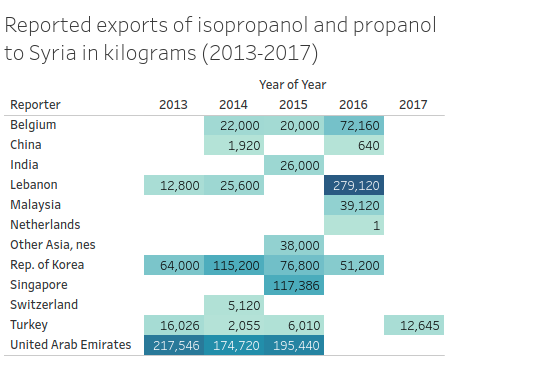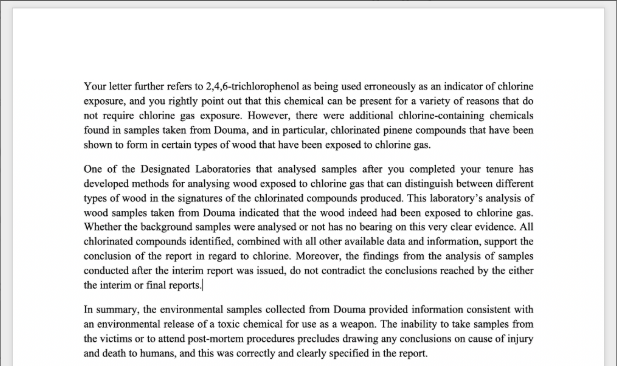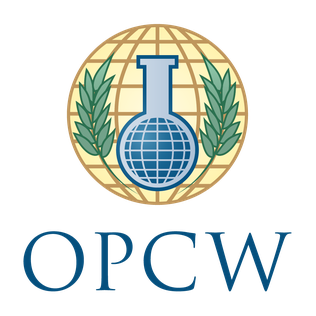Methodology: How we Tracked the Illegal Shipment of Sarin Precursor from Belgium to Syria
On 18 April 2018 Syrian Archive and Knack revealed information that Belgium violated EU sanctions against Syria according to the summons of an upcoming lawsuit. The Belgian customs found that without having requested the appropriate export licenses three Flemish companies have exported 96 tonnes of isopropanol in a concentration of 95% or higher to Syria since sanctions came into force in September 2013.
The Syrian Archive has worked with Belgian news outlet Knack on this investigation for the past year. All of the information was publicly or collaboratively sourced through searching online databases, submitting Freedom of Information Requests and requesting statements from authorities, courts and companies involved.
This article documents some of the open source investigative methods employed in our investigation that discovered several key pieces of information.
Global trade figures
Syrian Archive staff began our investigation in the aftermath of last year April’s sarin attack in Khan Sheikhoun in which the Organisation for the Prevention of Chemical Weapons (OPCW), that oversees compliance with the Chemical Weapons Convention, examined samples from and around the impact crater in Khan Sheikhoun, finding in laboratory tests that isopropanol was used in the production of sarin used in the attack.
We consulted The UN Comtrade database to identify whether any shipments of isopropanol, a sanctioned chemical from EU Member States to Syria, were reported after sanctions were put in place in 2013.
Comtrade, coordinated by the United Nations Statistical Division, collects monthly and annual trade statistics from more than 170 countries and displays these figures online in a public, downloadable and queriable format. The OCCRP similarly queried the Comtrade database in their investigation of Croatian arms sales being diverted to Syria.
Below is a walkthrough of the search we conducted on the Comtrade database.
While amounts reported to Comtrade may potentially under-represent true trade export figures due to self-reporting bias, the data shows that since 2014, an estimated 1.28 million kilo of propanol and isopropanol were exported by various countries to Syria (both propanol and isopropanol are registered under the same code). See below:

Source: UN Comtrade. Reported exports of isopropanol and propanol to Syria in kilograms (2013-2017)
The distinction between propanol and isopropanol is essential. While isopropanol in concentration of 95% or higher is prohibited without prior approval, propanol is not.
Data collectors
In order to find out whether the figures provided by Comtrade referred to propanol or isopropanol, we contacted the Trade Statistics Branch of the United Nations Statistics Division in April 2017 to inquire as to whether disaggregating figures was possible. Comtrade confirmed that they only have a single code in use for both for propanol and isopropanol (HS 290512). As a result, divorcing isopropanol from propanol figures within Comtrade figures was not possible.
In May 2017, we requested any additional information from the European Commission Service for Foreign Policy Instruments Restrictive measures team to inquire as to whether any Member States sought authorisation for the trading of isopropanol to Syria. In their answer, the European Commission stated they were “not in a position to provide advice on whether a concrete product falls under the technical specifications of an Annex to a Regulation” and that “Responsibility for the application of EU restrictive measures falls with the competent authorities of each Member State, as listed in Annex III to Regulation 36/2012.”
Through the Comtrade database we found that Belgium was the only EU Member State to continue exporting propanol/isopropanol to Syria since sanctions came into force in 2013, so we decided to focus efforts on investigating Belgium.
Courts and industry
Reaching a roadblock, and needing in country expertise, we reached out to investigative reporter Kristof Clerix of Knack, a Belgian weekly magazine. Clerix wanted to see what was going on out of public view and begun to file Freedom of Information Requests to various Belgium entities.
Belgium is divided into three regions: Flanders; Brussels; and Wallonia. Each with their own freedom of information policies. In Flanders, information about export licenses is published by the authorities on a monthly basis in public documents. So Clerix submitted Freedom of Information Requests to the other two regions.
Brussels and Wallonia replied to Freedom of Information Requests stating that no licenses were requested for the approval of isopropanol export to Syria during the 2013-2017 period.
After receiving those answers, Clerix also contacted Essenscia, the Belgian chemical sector umbrella organisation. After waiting six months to hear back, Essenscia stated that after extensive research and consultation with relevant stakeholders, it seemed “most likely that the export of (iso)propanol from Belgium to Syria is related to a trading company that has purchased the product abroad and then has handled it and exported it via Belgium.” Continuing on, the statement explains (emphasis in original):
“We have no indication whatsoever that the exported (iso)propanol to Syria has been produced or shipped by a chemical company located in Belgium. Moreover, the exported goods are fully approved by the customs authorities who severely monitor any trade with Syria since several years. All of this indicates that our country and our industry, who both support the Chemicals Weapons Convention and the Organisation for the Prohibition of Chemical Weapons (OPCW) in every possible way, cannot be linked to the intolerable incident in Syria.”
The statement was proven inaccurate by court documents received in subsequent months.
A publicly available document found by a Belgian expert consulted by Clerix revealed that in October 2016 in the Flanders region, authorities denied a permit request, preventing the export of €1.93 million of banned dual-use chemicals to Syria specified under Annex IX of the European sanctions against Syria. It has been confirmed by the Flemish authorities that this did not relate to isopropanol.
Belgian Customs confirmed that indeed shipments of (iso)propoanol to Syria had been made, although propanol and isopropanal figures were not disaggregated.
According to the summons cited by Antwerp Criminal Court press judge Roland Cassiers, a criminal case is currently being pursued by Belgian customs against three companies and two individuals. This case is set to begin on the 15 May 2018.
Our year long investigation revealed many key pieces of information located through open source investigative techniques. The Syrian Archive along with Knack will continue to pursue and document the case as it unfolds.


